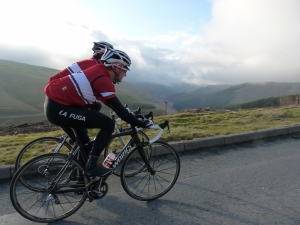Blog
Taming the Dragon
For the last few years La Fuga has been giving people the chance to experience the great European sportives and granfondos. From La Marmotte to the Maratona, La Fuga has provided the backup and knowledge to help riders successfully complete these gruelling events. With the UK sportive scene quickly catching up with its continental cousins, we’ve decided to extend our calendar to include UK events for the first time in 2011. Top of most people’s list of must-ride UK sportives is the Dragon Ride. So ahead of the main event in June, we decided to reccy the Dragon and give you our thoughts on a route that rivals some of the big European events.
La Marmotte has the Galibier and Alpe d’Huez, Maratona the Giau and the Falzarego. The iconic climbs of the Dragon Ride are the Bwlch and the Rhigos, almost as difficult to pronounce as they are to ride. In my previous life as a racer I’d suffered on these climbs as part of the Five Valleys Race, a round of the British Road Race Series. No other race on the calendar featured such long and gruelling climbs rivalling those on the continent. As a climbing expert I looked forward to this race each year. In the mountains, tactics are rendered useless, the strongest survive and at the Five Valleys I appreciated the egalitarian nature of the racing. That didn’t make the pain any less though.

The memories of the race started to seep back into my consciousness as we approached Port Talbot. The chimneys, chutes and massive structures of the steel works dominate the horizon as you approach from the South. On your right the land starts to rise up and you realise there is some climbing in store. After Cwmafan the road starts to tilt, almost imperceptively at first, but by the time you reach the village of Cymer, the serious climb of the Bwlch has started. The climb hugs the contours as it climbs past barren slopes colonised only by the hardiest moorland species. Shelter from the wind is non-existent. The approach to the summit is marked by two hairpins which give a slight reprieve from the incessant 6-7% gradient of the bulk of the climb.

The reward for taming this brute is the fantastic panoramic descent as you drop into the Rhondda Valley. There’s not much time to enjoy it though, or refuel, before the second big challenge of the day is encountered – the Rhigos. The Rhigos starts much as the Bwlch finished, with a couple of Alpine style hairpin bends as the road climbs out of Treorci. With those bends dispensed with, the remainder of the climb is pretty straight with little respite. More shelter is provided this time on the right with evergreen forest to provide some defence from the wind. As you approach the summit, you have a box-seat view of the impressive Blaenrhondda Waterfalls, a sight I’d never noticed in years of riding the Five Valleys – funny that. By this point in the race, the selection had usually been made, the strongest climbers distancing themselves from the other riders with more gravity-related issues.
Another fine descent off the Rhigos and a chance to tuck in and hit max speed. From Glynnedd, the road rises again on the climb of Coelbrenn. Coelbrenn is one of these climbs that sneaks up and bites you on the bum. It stealths in under the radar; it’s not the Bwlch or the Rhigos but in the same way as the Santa Christina feels like torture after the Gavia and Mortirolo in the Granfondo Marco Pantani, Coelbrenn is a shock to the system – a surprise on the legs mentally more than physically.
Before we knew it, it was Bwlch time again. The accumulated fatigue in the legs was partially compensated by some welcome early Spring sunshine to warm the back of the legs and raise the spirits. Further spirit-raising was the realisation that it’s all pretty much downhill from this point. A right turn at the top this time drops you past some impressive shear cliffs of black Silurian Slate, dating from the formation of the Welsh hills and valleys 400 million years ago. Luckily the ride to the finish wasn’t measured on geological timescales; we were soon back at Pencoed after stretching our legs in the run in. We can’t wait to return in June to recommence battle with the powers of nature – Welsh style.

The Dragon Ride is one of the longest running and most popular events on the British sportive calendar. First held in 2004, its’ format is similar to that of the great Granfondos in Italy, proving popular with riders, means entries selling out within hours. Organiser Lou Lousardi, who has strong family links back to Italy, recognised the appeal of the Italian Granfondos and decided to emulate the format back in the UK.




